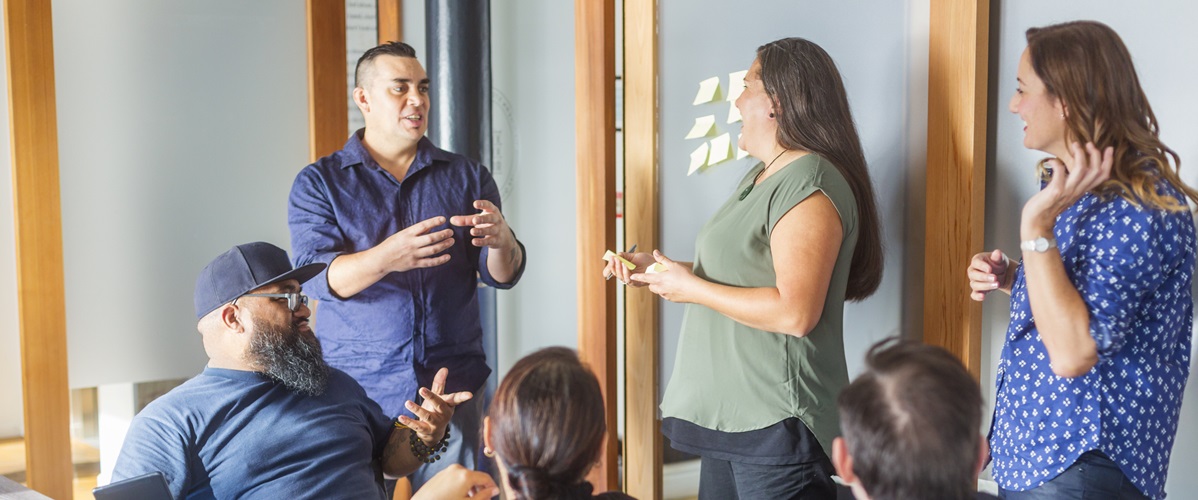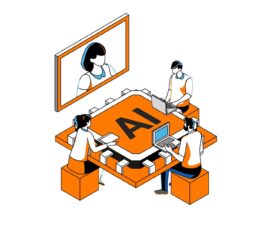For the first time in the history of telecommunications, over 500 citizens, economic stakeholders and internal staff were invited to give their opinions on the future of mobile and digital networks.
Designing the sustainable networks of tomorrow: An approach takes root in the European ecosystem
The Hexa-X-II project for the design of sustainable 6G, funded by the European Commission, opened an unprecedented dialogue at EU level aimed at reimagining our networks.
This project, which ran between 2023 and 2025 and involved 44 partners from across the European telecommunications ecosystem (including carriers, SMEs, and stakeholders from industry and academia), aimed to define the requirements and objectives for the design of sustainable, inclusive and reliable 6G.
Discussions on developing these networks continue as part of the SUSTAIN-6G project, running from 2025 to 2027. The consortium is developing solutions in three specific areas—energy/smart grid, e-health and telemedicine, and agriculture—with its focus remaining the establishment of a more sustainable 6G system.
The ratio of positive to negative impacts generated by technological innovations should be assessed and used to determine whether or not they are implemented.
An approach based on partnering with local stakeholders
This one-of-a-kind local consultation revealed a French society au fait with digital challenges and eager to take back control of technological development.
As one Grenoble participant of this consultation said: “When it comes to digital technology, every aspect of society is involved, and its appearance, everyday experience, environment and customs are transformed… it is vital that people knowingly choose such developments and are not simply subjected to them.”
Participants set out a clear vision: Digital technology must serve humans and the planet, not the other way around. Their accounts depict a more responsible, energy-efficient and democratic digital future.
From Lannion to Lyon, from Strasbourg to Grenoble by way of Paris, this consultation was conducted across France to gather a wide range of points of view. Citizens, entrepreneurs, students, local officials and internal staff all contributed to this collective discussion on our shared digital future.
A qualitative approach was used to allow for spontaneous expression and in order to fully understand perceptions, values and expectations.
Partnerships were established with local stakeholders: local authorities, universities, CCSTI (centres de culture scientifique, technique et industrielle — scientific, technical and industrial cultural centres) and business associations.
How digital technology is perceived today: vital and anxiety-provoking
Participants unanimously acknowledged the importance of digital technology in their daily lives. Telecommunications networks have transformed our way of life, making it easier to communicate with loved ones, enabling remote work and opening up access to knowledge. This technological revolution has achieved huge time savings, reduced travel and promoted social inclusion for a great many people, for example through the greater ease of access to information and knowledge.
As highlighted by the Hexa-X-II community survey, “Digital technology is a tool for expressing yourself and watching others express themselves”.
However, this growing digital arena is leading to increasing digital dependence, which is a great cause for concern. Participants expressed serious fears around the rise of social isolation, which is particularly evident among younger generations. The perception that human relationships are becoming excessively virtual and face-to-face interactions are increasingly rare was a key concern for all categories of participants.
As a department manager at Lannion’s town hall pointed out: “I wonder about how we relate to the world, to others, to nature. Specifically future generations, how will they develop these relationships with others, with the world, with nature? The thought terrifies me.”
So digital technology today has become a vital tool but also a source of tension.
Is our society resilient enough?
The hyperconnection of our societies raises crucial questions on the subject of resilience. Participants expressed concern about increasing vulnerability to cyberattacks, the fragility of automated systems and the progressive loss of traditional skills. This dependence on technology, which started out as a convenient tool, becomes a risk as soon as alternatives disappear and our entire society is reliant on these digital infrastructures.
As one participant put it at a workshop with the business community in Lyon: “What happens to resilience when an entire society has become dependent on its technology… and we no longer have knowledge and skills of our own?”
An excessive pace of change
The constant acceleration of technological innovations represents a considerable “mental load” for users. Participants describe a sense of drowning in a sea of perpetual tool updates and technology that is increasingly complex to use. This race to innovate, which they perceive to be driven mainly by profit-seeking rather than real needs, serves to widen the digital divide and progressively dehumanise our social interactions.
Visions of the future: digital technology for the common good.
When asked about their expectations for the future networks, the perspective of participants shifted significantly. While today they are most concerned with coverage and service quality, their priorities for 2035–2040 focus on carbon footprint optimisation, cybersecurity and the resilience of infrastructure. This shift reflects a collective awareness of the environmental and security issues that promise to shape our future society.
As one civil society participant said: “If it can help modern agriculture by reducing pesticide use or water consumption, while optimising production, then it is a positive development.”
The most popular use cases reveal a strong desire for digital technology that is geared towards the “common good”. The ratio of positive to negative impacts generated by technological innovations should be assessed and used to determine whether or not they are implemented. In this vein, guaranteed coverage for public services, digital health, environmental monitoring and connected cities for resource optimisation were found to be priority use cases. These choices demonstrate a collective desire to see technology serve the public interest rather than simply fuel economic growth.
Digital technology at the service of ecological transition
Participants set out a clear vision of digital technology as a positive force for environmental transformation. Such an approach goes far beyond mere impact reduction and envisions regenerative digital technology, capable of actively contributing to ecosystem restoration. Tomorrow’s technologies must must optimize the use of natural resources, promote biodiversity, and support economic sectors in their transition to sustainable models.
A more energy-efficient and resilient society
The “Transition(s) 2050” scenarios established by ADEME[1] were presented to participants. ADEME’s “Frugal generation” scenario received strong endorsement from participants. This vision of a sparing and responsible society, which prioritises essential services and minimises unnecessary consumption, aligns with their aspirations for a sustainable development model. Participants overwhelmingly rejected scenarios based on unbridled technological growth, preferring a balanced approach that blends energy savings, responsible innovation and environmental justice.
Security and sovereignty as cornerstones
In the face of geopolitical and environmental uncertainty, participants put security high on their list of expectations. This concept of security encompasses infrastructure cybersecurity, European digital sovereignty and personal data protection. They would like to see a genuine EU strategy on digital autonomy, with reduced dependence on non-EU actors and a guarantee that essential services can continue in all circumstances.
In the words of a participant from a workshop in Strasbourg: “The cybersphere is a real warzone… public authorities must be able to protect their citizens on the Internet as well as on the street.”
Where can action be taken to help people regain control?
- Education and citizen empowerment
Participants identified education as the key to collectively mastering our digital future. This education goes beyond simply acquiring tools; it involves ensuring a thorough understanding of the social, environmental and ethical issues related to technologies. Training on how to think critically, verify sources and use technology moderately and correctly must start from childhood to avoid overexposure and promote the digital autonomy of future generations. The development of AI techniques must also be accompanied by continuous training schemes to avoid exacerbating the digital divide.
- Democratic governance
For digital technology to truly serve the common good, many participants called for more democratic governance. They would like to see greater involvement from civil society in technological decision-making, in particular through citizen conventions on the future of digital technology. Those consulted expect fundamental freedoms and control to be balanced, and all players in the digital ecosystem to commit to shared responsibility.
- Europe as an ethical bulwark
The participants put their hopes in a strong and protective Europe, capable of defending its values against the global tech giants. Such a Europe must position itself as a leader in responsible innovation, developing its own ethical standards and technological expertise. Infrastructure pooling, the creation of a digital commons and the guarantee of a minimum level of service that anyone can access are the cornerstones of this European vision of the digital future.
One participant from the Strasbourg workshop expressed their desire for “a strong Europe to counterbalance Asia and the United States.”
Towards regenerative digital technology and transforming our relationship with it
According to a participant in the Lyon workshop, “it is always about nurturing life rather than nurturing capital”.
This citizen consultation paints a picture of regenerative digital technology that benefits society and the planet. Participants called for moving beyond a mindset of growth to focus on the regeneration of living systems and the strengthening of social bonds. This transformation requires commitment from everyone: educated and responsible citizens, companies who lead by example in their energy-saving initiatives and public authorities that guarantee fair and democratic regulation.
Perspectives — What should we take away from this unprecedented experience?
The expectations volunteered by participants has strengthened Orange’s commitment to the challenges of resilience and cybersecurity. Now more than ever, Orange must be people’s trusted carrier.
As for this experiment undertaken by Orange’s research teams, it has created a new dynamic in how we consider technological developments: an approach based on listening and proximity very early on in the process to better prepare the services of tomorrow, and thus develop sustainable value for and with our stakeholders.
[1] ADEME (Agence de l’environnement et de la maîtrise de l’énergie — French Agency for Environment and Energy Management) has devised four possible scenarios that could make the entire French economy carbon neutral by 2050: “Transition(s) 2050”.
513 people were consulted in France in total :
- 154 people from civil society
- 3 local workshops, October/November 2023, Lannion, Rennes, Châtillon
- 1 interactive exhibition, January 2024, Grenoble
- 2 student hackathons, February 2024, Grenoble
- 1 online survey, June 2024, Isère
- 103 people from the business community
- 2 online surveys, September/October 2024, France
- 1 Open Tech Days on-the-spot interview, November 2024, Châtillon
- 3 group workshops, November/December 2024, Lyon, Strasbourg
- 256 Orange Innovation employees
- 1 online survey, November 2024, France






